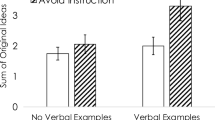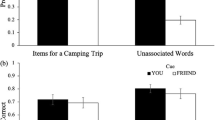Abstract
Four experiments examined participants’ ability to remember their own ideas in a modified Alternative Uses Task. Participants were asked to generate uses for objects, and on half of the trials participants were then asked to think of more uses. Memory for the initial uses they generated was then tested via a cued-recall task. Results demonstrated that participants forgot their initial uses as a consequence of thinking of new uses (referred to as the thinking-induced forgetting effect), and this effect persisted even when participants chose the subset of uses they thought were the most creative and to be remembered. The only scenario in which uses were protected from forgetting was when they were required to use their uses as hints for generating more ideas. Together, these findings demonstrate that one’s own ideas are susceptible to forgetting when additional ideas must be generated, indicating that thinking is a modifier of memory despite one’s motivation to preserve their ideas.



Similar content being viewed by others
Notes
Although not a goal of the present research, it is interesting to note that the results of Experiment 1 do provide some evidence of selective directed forgetting (see e.g., Delaney, Nghiem, and Waldum, 2009; Storm, Koppel, & Wilson, 2013). Specifically, looking at baseline items alone, selected uses in the selection condition (M = 0.77, SE = 0.02) were recalled significantly better than were uses in the remember-all condition (M = 0.70, SE = 0.02), t(94) = 2.49, p = 0.01, d = 0.51, whereas non-selected uses in the selection condition (M = 0.62, SE = 0.02) were recalled significantly worse than uses in the remember-all condition, t(94) = 2.14, p = 0.04, d = 0.44. This result suggests that participants were able to selectively forget the subset of uses that were deemed non-creative/not-to-be-remembered while maintaining (and even increasing) the accessibility of the subset of uses that were deemed creative/to-be-remembered.
On average, when attempting to recall the initially generated uses related to a given object at the time of final test, participants recalled 0.15, 0.11, 0.18, and 0.12 of the uses they had generated during the additional thinking phases of Experiments 1, 2a, 2b, and 3, respectively. It is interesting to note that significant thinking-induced forgetting effects were observed in Experiments 1 and 2 (for selected and non-selected items) even when we limited our analysis to participants who, as determined by median split, made the fewest number of intrusions, all p values <0.05.
References
Anderson, M. C. (2003). Rethinking interference theory: Executive control and the mechanisms of forgetting. Journal of Memory and Language, 49, 415–445.
Anderson, M. C., Bjork, R. A., & Bjork, E. L. (1994). Remembering can cause forgetting: retrieval dynamics in long-term memory. Journal of Experimental Psychology. Learning, Memory, and Cognition, 20, 1063–1087.
Anderson, M. C., Green, C., & McCulloch, K. C. (2000). Similarity and inhibition in long-term memory: evidence for a two-factor model. Journal of Experimental Psychology. Learning, Memory, and Cognition, 26, 1141–1159.
Anderson, M. C., & McCulloch, K. C. (1999). Integration as a general boundary condition on retrieval-induced forgetting. Journal of Experimental Psychology. Learning, Memory, and Cognition, 25, 608–629.
Angello, G., Storm, B. C., & Smith, S. M. (2015). Overcoming fixation with repeated memory suppression. Memory, 23(3), 381–389.
Aslan, A., & Bäuml, K. H. T. (2011). Individual differences in working memory capacity predict retrieval-induced forgetting. Journal of Experimental Psychology. Learning, Memory, and Cognition, 37(1), 264–269.
Bartlett, F. C. (1932). Remembering: An experimental and social study. Cambridge: Cambridge University.
Bäuml, K. H., & Hartinger, A. (2002). On the role of item similarity in retrieval-induced forgetting. Memory, 10(3), 215–224.
Bäuml, K. H. T., & Samenieh, A. (2010). The two faces of memory retrieval. Psychological Science, 21(6), 793–795.
Bertsch, S., Pesta, B. J., Wiscott, R., & McDaniel, M. A. (2007). The generation effect: a meta-analytic review. Memory & Cognition, 35(2), 201–210.
Carroll, M., Campbell-Ratcliffe, J., Murnane, H., & Perfect, T. (2007). Retrieval-induced forgetting in educational contexts: monitoring, expertise, text integration, and test format. European Journal of Cognitive Psychology, 19(4–5), 580–606.
Chan, J. C. K. (2009). When does retrieval induce forgetting and when does it induce facilitation? Implications for retrieval inhibition, testing effect, and text processing. Journal of Memory and Language, 61, 153–170.
Delaney, P. F., Nghiem, K., & Waldum, E. R. (2009). The selective directed forgetting effect: can people forget only part of a text? Quarterly Journal of Experimental Psychology, 62, 1542–1550.
Dienes, Z. (2014). Using Bayes to get the most out of non-significant results. Frontiers in Psychology, 5, 1–17.
Duncker, K., & Lees, L. S. (1945). On problem-solving. Psychological Monographs, 58(5), i.
Dunn, E. W., & Spellman, B. A. (2003). Forgetting by remembering: stereotype inhibition through rehearsal of alternative aspects of identity. Journal of Experimental Social Psychology, 39(5), 420–433.
Goodmon, L. B., & Anderson, M. C. (2011). Semantic integration as a boundary condition on inhibitory processes in episodic retrieval. Journal of Experimental Psychology. Learning, Memory, and Cognition, 37(2), 416.
Guilford, J. P. (1957). Creative abilities in the arts. Psychological Review, 64, 110–118.
Jeffreys, H. (1961). Theory of probability.
Jonker, T. R., Seli, P., & MacLeod, C. M. (2013). Putting retrieval-induced forgetting in context: an inhibition-free, context-based account. Psychological Review, 120(4), 852–872.
Kassam, K. S., Gilbert, D. T., Swencionis, J. K., & Wilson, T. D. (2009). Misconceptions of Memory: the Scooter Libby Effect. Psychological Science, 20(5), 551–552.
Koppel, R. H., & Storm, B. C. (2014). Escaping mental fixation: incubation and inhibition in creative problem solving. Memory, 22, 340–348.
Loftus, G. R., & Wickens, T. D. (1970). Effect of incentive on storage and retrieval processes. Journal of Experimental Psychology, 85(1), 141–147.
Luchins, A. S., & Luchins, E. H. (1959). Rigidity of behavior: A variational approach to the effect of Einstellung.
Macrae, C. N., & Roseveare, T. A. (2002). I was always on my mind: the self and temporary forgetting. Psychonomic Bulletin & Review, 9, 611–614.
Migueles, M., & García-Bajos, E. (2007). Selective retrieval and induced forgetting in eyewitness memory. Applied Cognitive Psychology, 21(9), 1157–1172.
Murayama, K., Miyatsu, T., Buchli, D., & Storm, B. C. (2014). Forgetting as a consequence of retrieval: a meta-analytic review of retrieval-induced forgetting. Psychological Bulletin, 140(5), 1383–1409.
Naveh-Benjamin, M., Craik, F. I., Gavrilescu, D., & Anderson, N. D. (2000). Asymmetry between encoding and retrieval processes: evidence from divided attention and a calibration analysis. Memory & Cognition, 28(6), 965–976.
Raaijmakers, J. G., & Jakab, E. (2013). Rethinking inhibition theory: on the problematic status of the inhibition theory for forgetting. Journal of Memory and Language, 68(2), 98–122.
Raftery, A. E. (1995). Bayesian model selection in social research. Sociological Methodology, 25, 111–164.
Schacter, D. L., & Addis, D. R. (2007). The cognitive neuroscience of constructive memory: remembering the past and imagining the future. Philosophical Transactions of the Royal Society B: Biological Sciences, 362(1481), 773–786.
Schilling, C. J., Storm, B. C., & Anderson, M. C. (2014). Examining the costs and benefits of inhibition in memory retrieval. Cognition, 133(2), 358–370.
Sio, U. N., Kotovsky, K., & Cagan, J. (2015). Fixation or inspiration? A meta-analytic review of the role of examples on design processes. Design Studies, 39, 70–99.
Slamecka, N., & Graf, P. (1978). The generation effect: delineation of a phenomenon. Journal of Experimental Psychology: Human Learning and Memory, 14, 592–604.
Smith, S. M. (1995). Getting into and out of mental ruts: A theory of fixation, incubation, and insight. In R. J. Sternberg & J. E. Davidson (Eds.), The nature of insight (pp. 121–149). Cambridge: MIT Press.
Smith, S. M. (2003). The constraining effects of initial ideas. In P. B. Paulus & B. A. Nijstad (Eds.), Group creativity: Innovation through collaboration (pp. 15–31). New York: Oxford University Press.
Smith, S. M. (2008). Invisible assumptions and the unintentional use of knowledge and experiences in creative cognition. Lewis & Clark Law Review, 12, 509–525.
Smith, S. M., & Blankenship, S. E. (1989). Incubation effects. Bulletin of the Psychonomic Society, 27(4), 311–314.
Smith, S. M., & Blankenship, S. E. (1991). Incubation and the persistence of fixation in problem solving. The American Journal of Psychology, 61–87.
Smith, R. E., & Hunt, R. R. (2000). The influence of distinctive processing on retrieval-induced forgetting. Memory & Cognition, 28, 503–508.
Smith, S. M., & Ward, T. B. (2012). Cognition and the creation of ideas. In K. J. Holyoak & R. G. Morrison (Eds.), The Oxford handbook of thinking and reasoning (pp. 456–474). New York: Oxford University Press.
Smith, S. M., Ward, T. B., & Schumacher, J. S. (1993). Constraining effects of examples in a creative generation task. Memory & Cognition, 21(6), 837–845.
Storm, B. C. (2011). The benefit of forgetting in thinking and remembering. Current Directions in Psychological Science, 20, 291–295.
Storm, B. C., & Angello, G. (2010). Overcoming fixation: creative problem solving and retrieval-induced forgetting. Psychological Science, 21, 1263–1265.
Storm, B. C., Angello, G., & Bjork, E. L. (2011). Thinking can cause forgetting: memory dynamics in creative problem solving. Journal of Experimental Psychology. Learning, Memory, and Cognition, 37, 1287–1293.
Storm, B. C., Angello, G., Buchli, D. R., Koppel, R. H., Little, J. L., & Nestojko, J. F. (2015). A review of retrieval-induced forgetting in the contexts of learning, eye-witness memory, social cognition, autobiographical memory, and creative cognition. The Psychology of Learning and Motivation, 141–194.
Storm, B. C., Bjork, E. L., & Bjork, R. A. (2007). When intended remembering leads to unintended forgetting. Quarterly Journal of Experimental Psychology, 60, 909–915.
Storm, B. C., & Jobe, T. A. (2012). Remembering the past and imagining the future: examining the consequences of mental time travel on memory. Memory, 20, 224–235.
Storm, B. C., Koppel, R. H., & Wilson, B. M. (2013). Selective cues to forget can fail to cause forgetting. Quarterly Journal of Experimental Psychology, 66, 29–36.
Storm, B. C., & Levy, B. J. (2012). A progress report on the inhibitory account of retrieval-induced forgetting. Memory & Cognition, 40, 827–843.
Storm, B. C., & Patel, T. N. (2014). Forgetting as a consequence and enabler of creative thinking. Journal of Experimental Psychology: Learning, Memory, and Cognition.
Vul, E., & Pashler, H. (2007). Incubation benefits only after people have been misdirected. Memory & Cognition, 35(4), 701–710.
Wagenmakers, E. J. (2007). A practical solution to the pervasive problems of p values. Psychonomic Bulletin & Review, 14(5), 779–804.
Ward, T. B., Smith, S. M., & Finke, R. A. (1999). Creative cognition. In R. J. Sternberg (Ed.), Handbook of creativity (pp. 189–212). New York: Cambridge University Press.
Wiley, J. (1998). Expertise as mental set: the effects of domain knowledge in creative problem solving. Memory & Cognition, 26(4), 716–730.
Acknowledgments
We thank O. Altamirano, S. Chea, J. Grinkevich, P. Gunalp, M. Hickman, S. Katawetheesakun, S. Kotzman, P. Small, S. Shrikanth, K. Ramakrishnan, and K. Williams for their assistance with data collection and data coding, as well as N. Davidenko for his comments on earlier versions of the manuscript.
Author information
Authors and Affiliations
Corresponding author
Ethics declarations
Conflict of interest
The authors declare that they have no conflict of interest.
All procedures performed in studies involving human participants were in accordance with the ethical standards of the institutional and/or national research committee and with the 1964 Helsinki declaration and its later amendments or comparable ethical standards.
Informed consent was obtained from all individual participants included in the study.
Rights and permissions
About this article
Cite this article
Ditta, A.S., Storm, B.C. That’s a good idea, but let’s keep thinking! Can we prevent our initial ideas from being forgotten as a consequence of thinking of new ideas?. Psychological Research 81, 678–689 (2017). https://doi.org/10.1007/s00426-016-0773-2
Received:
Accepted:
Published:
Issue Date:
DOI: https://doi.org/10.1007/s00426-016-0773-2




